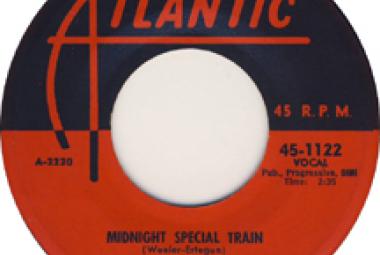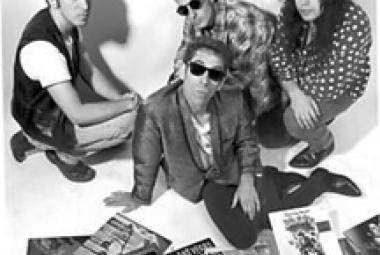“Rumble” is a blues instrumental by Link Wray & His Ray Men. Originally released in 1958, “Rumble” utilized the techniques of distortion and feedback, then largely unexplored in rock and roll. The piece is one of very few instrumental singles banned from the radio airwaves. It is also one of the first tunes to use the power chord, the “major modus operandi of [the] modern rock guitarist”. (More from Wikipedia)
Pete Townshend has been quoted as saying: “He is the king. If it hadn’t been for Link Wray and ‘Rumble’, I would have never picked up a guitar.”
Whether or not Link Wray heard the 1950’s blues records with earliest power chords and got the idea has not been established as far as I know. He refined his technique over a period of time during gigs. While working up an instrumental backing for their version of a really fine early rock and roll song “The Stroll” (originally by the Diamonds), Link Wray and His Ray Men hit upon a slow-paced but incredibly powerful instrumental that they first called “Oddball”. The first time they played it, it was a huge hit with the audience, who demanded four encores of the performance.
Phil Everly of the Everly Brothers reportedly heard the song and suggested the name “Rumble” since it sounded like a street fight to him. Archie Bleyer, a record producer for Cadence Records also heard about it but hated the song. However, Bleyer’s step-daughter Jackie Ertel and some of her friends loved the song. Some sources even say that Jackie Ertel, not Phil Everly came up with the name – the two later married.
* * *
Ultimately "Rumble" was released in 1958. Mostly the performance is simply Link Wray strumming his guitar in a menacing manner, backed up with a solid rock band; when you are doing something brand new, that is sometimes all it takes. Toward the end, Wray does some furious solos that any modern guitarist would be proud of and later begins to introduce distortion and feedback.
The song was banned in several major radio markets, including New York and Boston (perhaps self-censorship would be a better term, since it was mostly the DJ’s who took it upon themselves not to play the song) due to the fear that its rough sound glorified juvenile delinquency. Even Dick Clark sort of tip-toed around the controversy when the song was introduced on American Bandstand: He never actually mentioned the name of the song.
Yes, you read right: This instrumental song with no lyrics at all was banned in several cities across the country; no other American instrumental has ever suffered that indignity, though of course, there is no question that the controversy also helped record sales. Several of his other singles had similarly aggressive names: “Jack the Ripper”, “El Toro”, “Roughshod”, “The Stranger”, etc.
Not even Communist countries seemed to have problems with instrumental songs: I have two CD’s of quite good rock instrumentals that were recorded and officially released in nations behind the Iron Curtain during the 1960’s; no doubt that there was plenty of censorship in Communist countries, but there was some rock and roll that was made available even there. When the British Invasion hit, even the Russkies had to let in some of the real stuff; this music was recorded before that.
To this day, the raw sound that Link Wray and His Ray Men generated in “Rumble” is somewhat startling; unlike much “ground-breaking” material that is left in the dust when other artists take the musical ideas and run with them, “Rumble” still casts something of a spell.
* * *
The 2008 documentary, It Might Get Loud shows rock guitarist legends from three generations discussing their music and their careers and their influences: Jimmy Page (the Yardbirds, Led Zeppelin), The Edge (U2), and Jack White (the White Stripes, the Raconteurs). Needless to say, they all three made the Rolling Stone list of 100 Greatest Guitarists also: #3, #38 and #70, respectively.
At one point, Jimmy Page starts flipping through a pile of 45’s and pulls out “Rumble”. To see a rock legend grooving along with that song, to see that big beaming smile on his face, to hear him discussing how the song developed, to see Page actually doing “air guitar” to “Rumble”: that really is something special. The clip from It Might Get Loud is well worth a viewing: www.youtube.com/watch?v=RLEUSn8y9TI .
* * *
When Link Wray died in 2005, both Bob Dylan and Bruce Springsteen played “Rumble” live in tribute.
* * *
As it happens, I have a live album by Link Wray from the same time period as the original Link Protrudi and the Jaymen, called Live in ’85. His live performance of “Rumble” using 1980’s technology alone is worth seeking this album out.
(February 2013)















